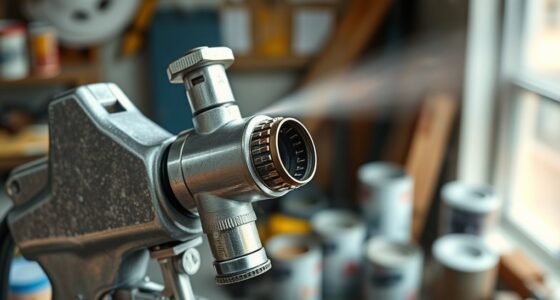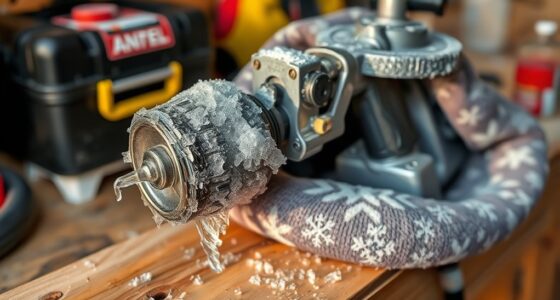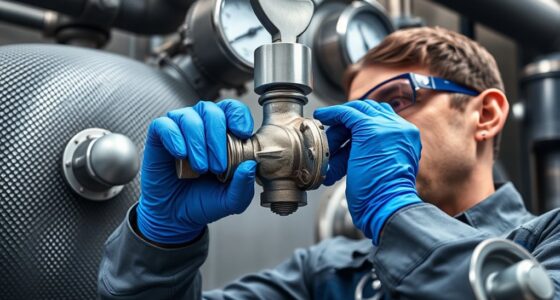You should oil your sprayer before and after each use to keep it running smoothly, prevent rust, and extend its life. Focus on lubricating moving parts like the pump handle, trigger, and joints with a lightweight, suitable lubricant. After applying oil, operate the trigger or pump to distribute it evenly, then wipe away excess. Proper storage, including oiling internal parts and sealing the unit, helps maintain readiness. Keep going to discover detailed steps for effective maintenance.
Key Takeaways
- Oil your sprayer after each use or when parts feel sluggish to ensure smooth operation.
- Before applying oil, clean any rust, corrosion, or debris from moving parts.
- Use a lightweight, non-gumming lubricant suitable for sprayer materials, applying a few drops to joints and triggers.
- Operate the trigger or pump after oiling to evenly distribute lubricant, then wipe away excess to prevent dirt buildup.
- Store the sprayer in a dry, cool place, applying a light coat of oil before long-term storage to prevent rust and corrosion.

Regularly oil your sprayer to guarantee smooth operation and extend its lifespan. Proper maintenance is essential if you want your sprayer to work reliably when you need it. One key aspect of maintenance tips is knowing when and how to oil the various moving parts. Doing this correctly will prevent rust, reduce wear and tear, and keep your sprayer functioning efficiently. It also involves following proper storage procedures, especially during off-season periods, to avoid damage caused by corrosion or dried-out components.
Start by inspecting your sprayer before each use. Look for signs of rust, corrosion, or buildup that could hinder performance. If you notice any, give the affected parts a quick cleaning before applying oil. When applying oil, focus on the pump handle, trigger mechanisms, and any moving joints. Use a lightweight, non-gumming lubricant that’s suitable for your sprayer’s materials. A few drops are usually enough—over-oiling can attract dirt and debris, which could clog or damage the parts. Proper lubrication is crucial for maintaining the longevity of your equipment.
Inspect and clean your sprayer before each use; apply light oil to moving parts to prevent rust and ensure smooth operation.
To oil effectively, operate the trigger or pump a few times after applying the lubricant. This helps distribute the oil evenly across moving components. Be sure to wipe away any excess oil to prevent dirt accumulation. Regularity is key—make oiling a part of your routine, especially after each use or whenever you notice sluggish movement. Doing so ensures your sprayer stays in prime condition and works smoothly every time.
When it comes to storage procedures, proper steps can make a significant difference. After using and cleaning your sprayer thoroughly, apply a light coat of oil to prevent rust, especially if you plan to store it for an extended period. Store your sprayer in a dry, cool place, away from direct sunlight and moisture. Keep it upright or in a position that prevents any residual liquid from leaking or pooling. If your sprayer has seals or gaskets, check them regularly for signs of deterioration and apply a bit of oil to keep them pliable.
During long-term storage, consider emptying the tank and running a small amount of oil or a storage-specific preservative through the system. This helps lubricate internal parts and prevents corrosion. Covering or sealing your sprayer also protects it from dust and environmental contaminants. Following these storage procedures ensures that your investment remains in good shape and ready for use whenever you need it. Proper maintenance tips combined with correct storage procedures will keep your sprayer functioning smoothly for years to come.
Frequently Asked Questions
Can I Use Household Oil in My Sprayer?
You shouldn’t use household oils or synthetic lubricants in your sprayer because they can clog the system or cause damage. Instead, opt for oils specifically designed for sprayers, like silicone or light machine oil. These are formulated to lubricate parts without causing buildup or harm. Always follow the manufacturer’s instructions for oiling your sprayer to guarantee peak performance and longevity.
How Often Should I Oil a New Sprayer?
Think of your new sprayer as a finely tuned race car that needs regular oiling to perform at its best. You should oil your sprayer during regular sprayer maintenance, usually every 20-30 hours of use or as recommended by the manufacturer. Consistent oil application frequency helps prevent rust and keeps parts moving smoothly, ensuring your sprayer stays reliable and efficient over time.
What Are the Signs of a Properly Oiled Sprayer?
You’ll know your sprayer is properly oiled when it operates smoothly without sticking or squeaking. During sprayer maintenance, look for even oil coverage on moving parts and check that no areas are dry or rusty. Effective oil application techniques ensure all components are adequately lubricated, preventing wear. Regularly inspecting and maintaining your sprayer keeps it in top condition, making your work easier and extending its lifespan.
Is There a Difference Between Oil Types for Sprayers?
Yes, there is a difference between oil types for sprayers. You should select oils compatible with your sprayer’s materials and designed for its specific use. For instance, some oils are better for pump lubrication, while others prevent corrosion. Always check your manufacturer’s guidelines to guarantee you pick the right oil type, as using incompatible oils can damage your sprayer and reduce its lifespan. Proper oil choices keep your sprayer functioning smoothly.
Can I Over-Oil My Sprayer?
Yes, you can over-oil your sprayer. Following a maintenance schedule is key—apply oil only as recommended in your oil application tips. Over-oiling can cause buildup, clogging, or damage to the pump and seals. Be sure to clean excess oil after application and avoid excessive use. Stick to the recommended amount to keep your sprayer functioning smoothly without risking unnecessary wear or damage.
Conclusion
Just as a finely tuned instrument produces beautiful music, regularly oil your sprayer guarantees it performs at its best. Think of it as caring for a trusted companion—your tools deserve attention to keep working smoothly. Don’t wait until rust and wear take hold; stay proactive. With proper maintenance, your sprayer will serve you faithfully, helping you nurture your garden or projects with ease. Keep it well-oiled, and it’ll reward you with years of reliable service.
Franz came aboard the Paint Sprayer Zone team with a background in both journalism and home renovation. His articulate writing style, combined with a passion for DIY projects, makes him an invaluable asset. Franz has a knack for breaking down technical jargon into easy-to-understand content, ensuring that even the most novice of readers can grasp the complexities of paint sprayers.










